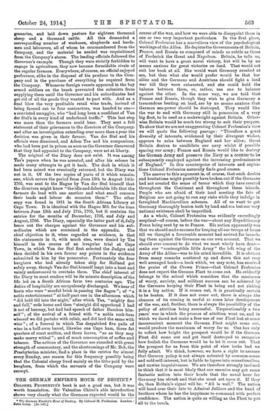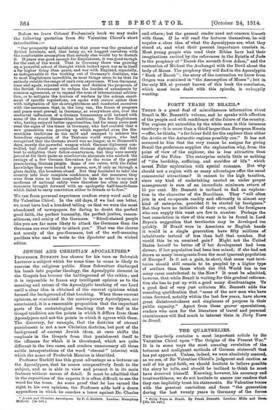THE GERMAN EMPIRE'S HOUR OF DESTINY.* COLONEL FROBENIUS'S book is
not a good one, but it was worth translation, Sir Valentine Chirol's able introduction shows very clearly what the Germans expected would be the
• The German Empire's Hour of Destiny. By Colonel H. Frobenius. London : John Long. 12s. net.] course of the war, and how we were able to disappoint them in one or two very important particulars. In the first place, Colonel Frobenius has a marvellous view of the psychological workings of the Allies. He depicts the Governments of Britain, France, and Russia as composed of minds as subtle as those of Frederick the Great and Napoleon. Britain, he tells us, will want to have a great naval victory, but will be by no means anxious for great victories on land. That would not suit her book at all. She would want Germany crushed at sea, but then what she would prefer would be that her allies and the Germans and Austrians should fight a land war till they were exhausted, and she could hold the balance between them, or, rather, use one to balance against the other. In the same way, we are told that France and Russia, though they wish to give Germany a. tremendous beating on land, are by no means anxious that German sea-power should be destroyed. They would like the war to end with Germany still in possession of a very big fleet, to be used as a makeweight against Britain. Other- wise Britain would be much too strong to suit their purpose. To show that we are not exaggerating Colonel Frobenins's view we will quote the following passage : " Therefore a great diversity of interests, evidenced by their divergent wishes, appears to arise between England and her allies ; Great Britain desires to annihilate our navy whilst if possible sparing our army; France and Russia would like to destroy the German Army and preserve the Navy as a counter to be subsequently employed against the increasing predominance of England." In this counterpoise of interests and aspira- tions Colonel Frobenius naturally finds good omens.
The answer to this argument is, of course, that such doubts and hesitations might possibly have broken out if the Germans had not created the sense of terror which they have created throughout the Continent and throughout these islands. People who are afraid of their land meeting the fate of Belgium are not going to run any risks while they indulge in farsighted Machiavellian schemes. All of us want to get Germany thoroughly beaten both by land and sea. lest our very national existence shall be imperilled.
As a whole, Colonel Frobenius was evidently exceedingly sceptical—of course, before the war—about any Expeditionary Force being sent by us to France. His notion apparently was that we should make excuses for keeping all our troops at home till we thought a favourable moment had arrived for launch- ing them against the Germans on our own account. That we should ever consent to do what we most wisely have done— make our "contemptible little Army" the left wing of the Army of the Allies—was to his mind incredible. It is obvious from many remarks scattered up and down this not very well arranged book—a book which, we may note, has received the praise of the Crown Prince—that Colonel Frobenius does not expect the German Fleet to come out. He evidently belongs to the school which considers that the maximum of worry, anxiety, and militant success can be achieved by the Germans keeping their Fleet in being and not risking it in a big action. If it comes out, it is practically certain to be beaten. If it does not come out, there is always the chances of its coming in useful at some later development of the war, and, further, there is always the possibility of the policy of attrition being successful. Unquestionably a two years' war in which the process of attrition went on, and in which we dared not make a free use of our Fleet lest at some inconvenient moment the German Fleet might come out, would produce the maximum of worry for us. One has only to reflect how bright the prospect would be if the German Fleet did come out and get itself destroyed to recognize how foolish the Germans would be to let it come out. Tbat the prospect for us from this point of view looks bad we fully admit. We think, however, we have a right to assume that German policy is not always actuated by common-sense and cold self-interest, but is liable to lapses into sensationalism and unwise impulsiveness. We are therefore strongly inclined to think that it is most likely that our enemies may get some fantastic notion into their heads that the naval hour for Germany has struck and that she must act upon it. If they do, then Britain's signal will be: "All is well." The nation will hand over their fate to Admiral Jellicoe and the band of brothers whom he has the happiness to command with perfect confidence. The nation is quite as willing as the Fleet to put all to the touch.
Before we leave Colonel Frobenins's book we may make the following quotation from Sir Valentine Chirol's short introduction :-
" Our prosperity had satisfied us that peace was the greatest of British interests, and, that being so, we hugged ourselves with the comfortable assumption that nobody else would try to disturb it. If peace was good enough for Englishmen, it was good enough for the rest of the world. That in Germany there was growing up a powerful school of thought which looked upon war as in itself a far higher thing than peace, and war with England, especially, as indispensable to the working out of Germany's destinies, was to most Englishmen incredible, as most things seem to be that lie entirely outside the range of one's own experience. When Germany, time and again, rejected with scorn and derision the proposals of the British Government to reduce the burden of armaments by common agreement, or to expand the area of international arbitra- tion, or to mitigate the horrors of warfare by the solemn enact- ment of specific regulations, we spoke with sorrow rather than with indignation of her shortsightedness and comforted ourselves with the assurance that, in the long run, the forces of progress and peace must prevail in Germany, as everywhere else, over the mediaval influences of a German bureaucracy still imbued with some of the worst Bismarckian traditions. The few Englishmen -who, having enjoyed better opportunities, had for many years past read the signs of the times in Germany, who had realized that a new generation was growing up which regarded even the Bis- marckian traditions as too mild and cramped to achieve the boundless expansion of the Teutonic world empire, who had recognized that the German sword was no longer, as in Bismarck's days, merely the powerful weapon which German diplomacy con- trolled, but itself now controlled German diplomacy, did their best to enlighten their fellow-countrymen, but they were merely jeered at for their pains as mischievous alarmists who mistook the ravings of a few German fire-eaters for the voice of the great peace-loving German people. Seine of our rulers, with the fuller knowledge they were bound to possess, saw, if only as through a glass darkly, the breakers ahead. But they hesitated to take the country into their complete confidence, and the measures they were from time to time compelled to take in order to secure a modicum of national safety were therefore too often only half measures brought forward with an apologetic half-heartedness which failed to carry conviction either to friends or to foes."
We can from personal experience confirm every word said by Sir Valentine Chirol. In the old days, if we had one letter, we must have had a hundred telling us that we were the most abandoned of newspapers for daring to doubt the perfect good faith, the perfect humanity, the perfect justice, reason- ableness, and sanity of the Germans. "Blood-stained people like you are far more likely to attack the Germans than the Germans are ever likely to attack you." That was the chorus not merely of the pro-Germans, but of the well-meaning pacifists who used to write to the Spectator and its wicked
editor.



































 Previous page
Previous page